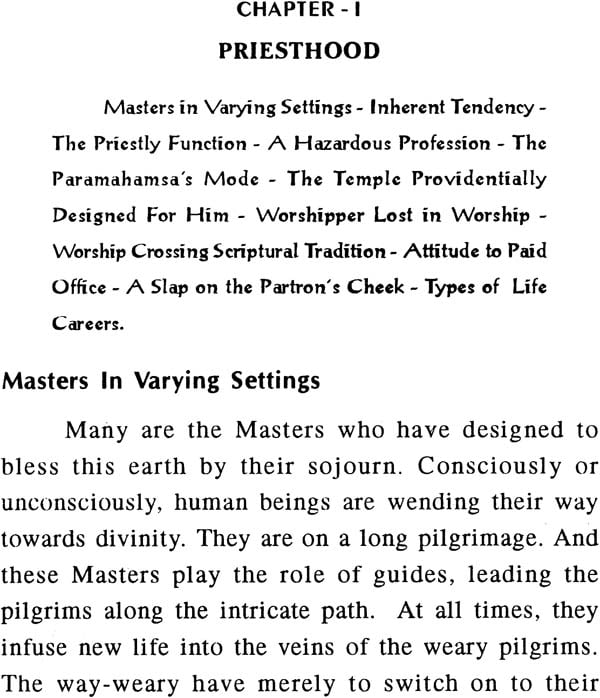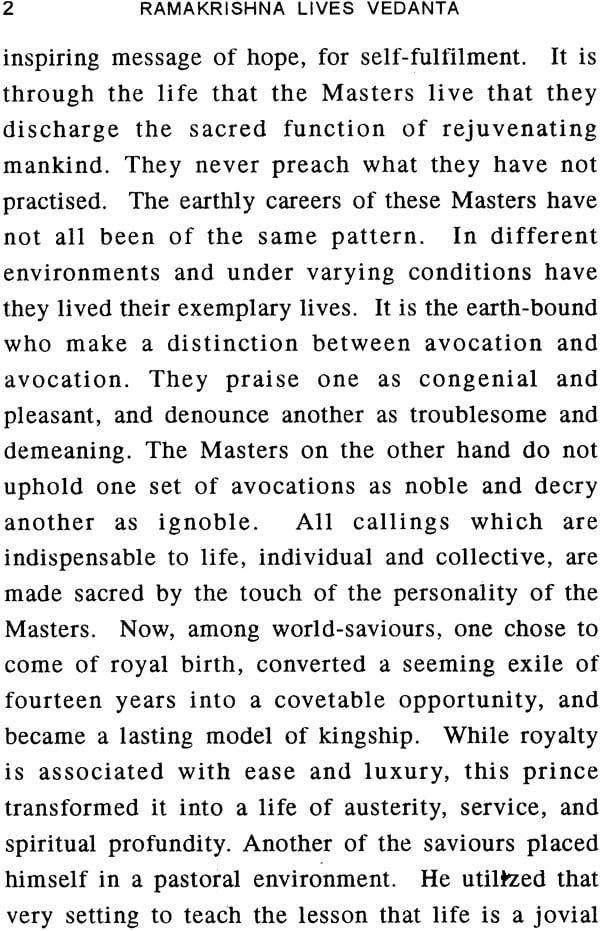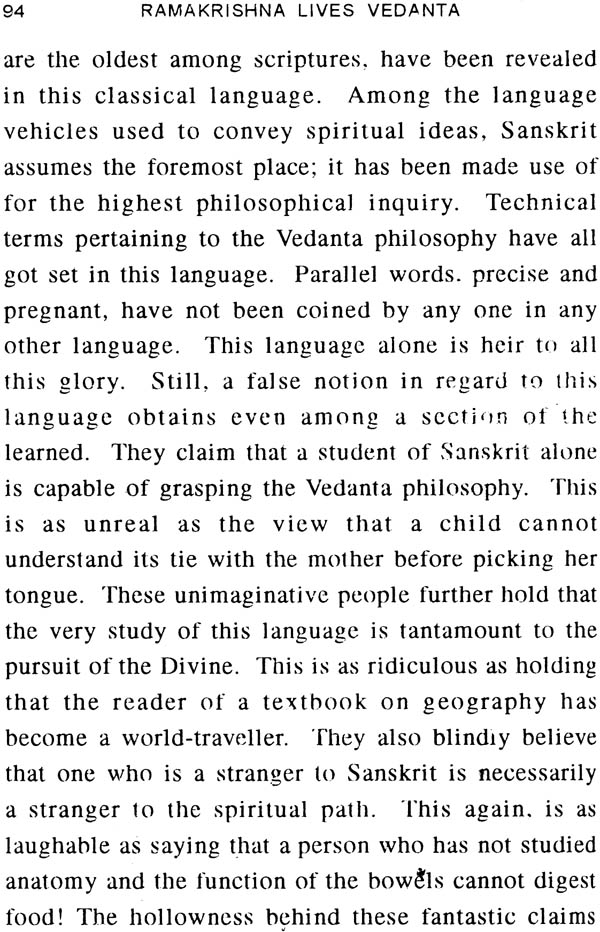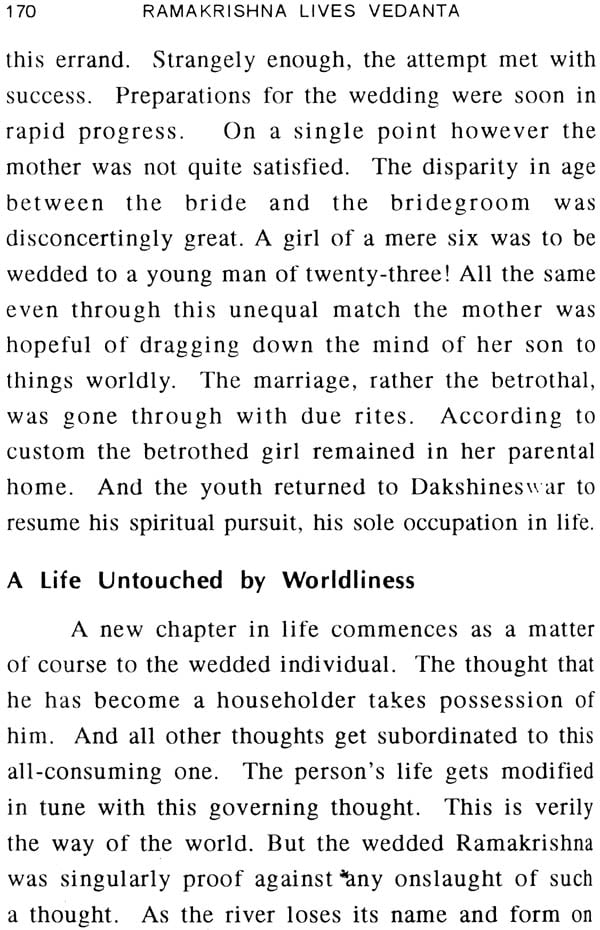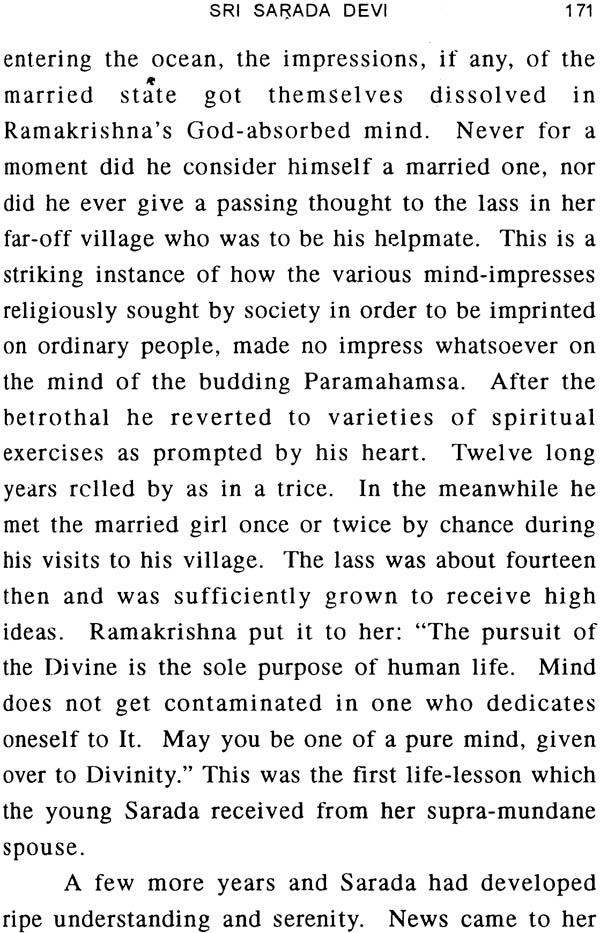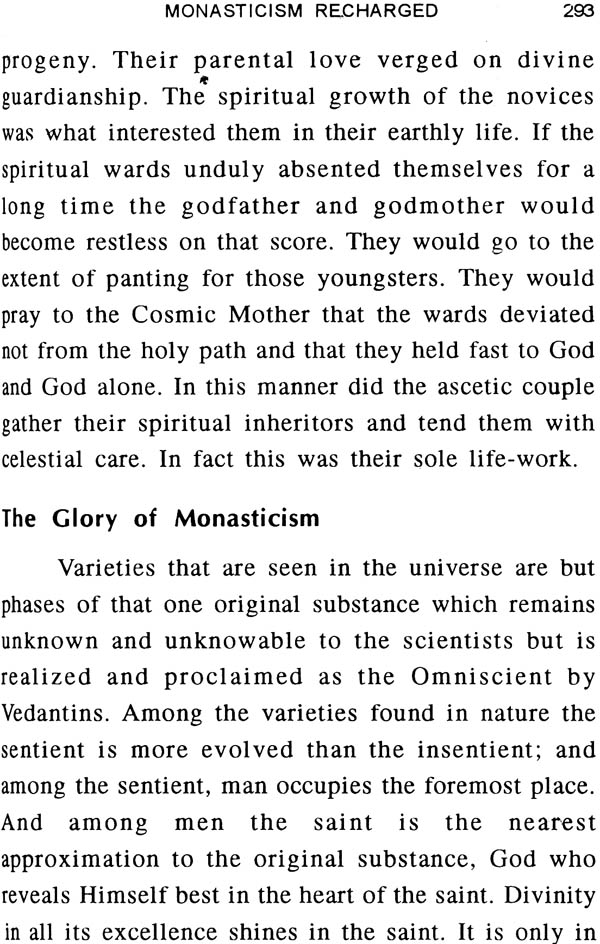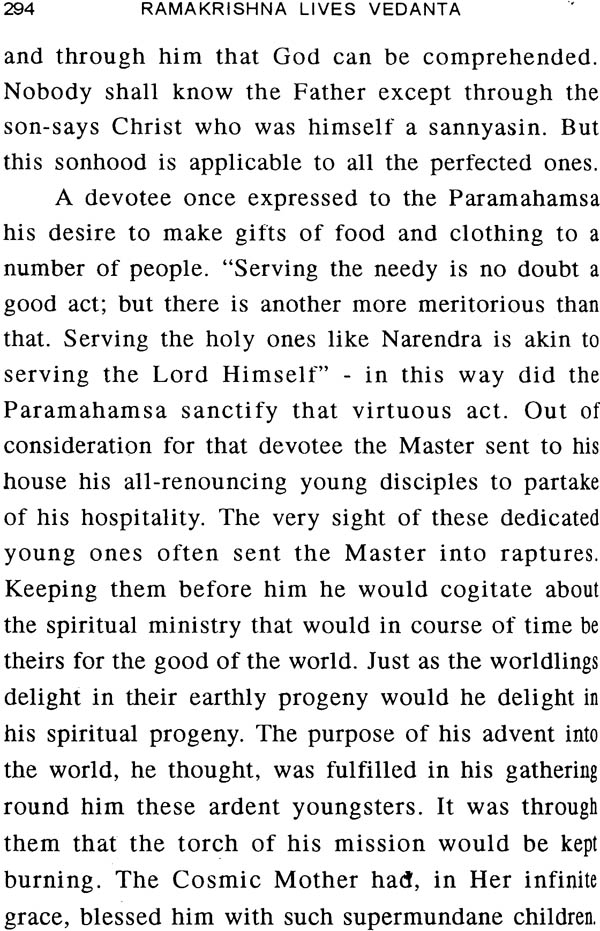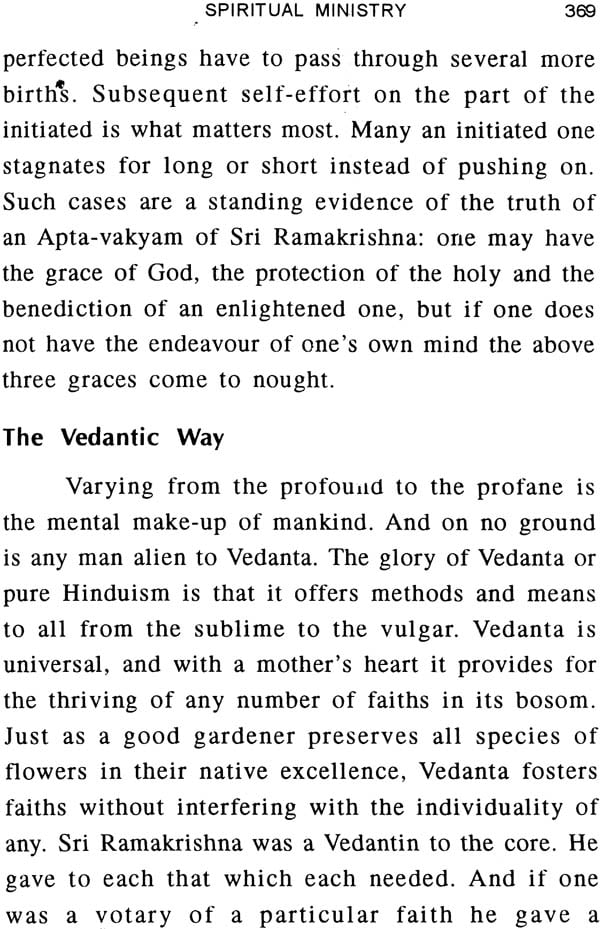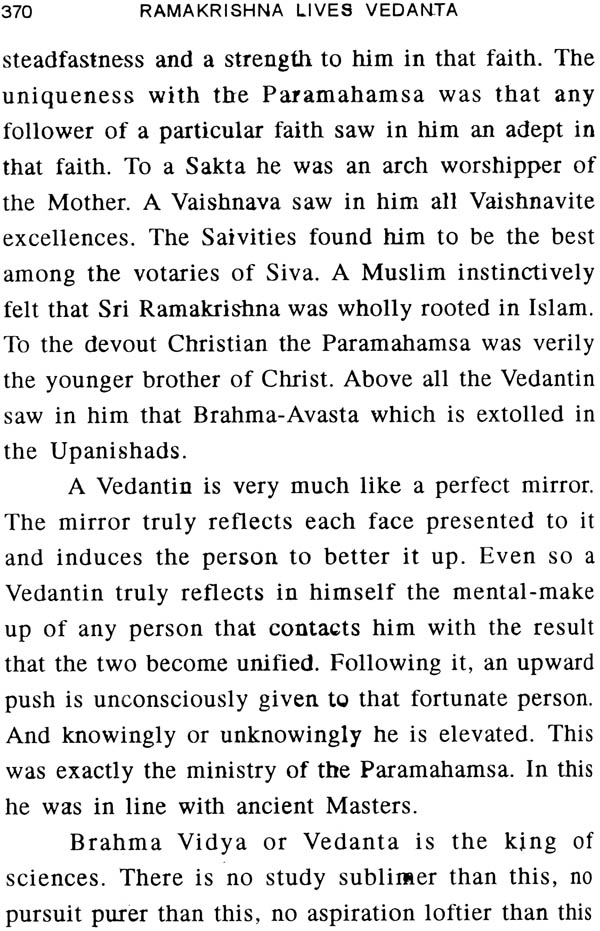
Ramakrishna Lives Vedanta
Book Specification
| Item Code: | IDK830 |
| Author: | Swami Chidbhavananda |
| Publisher: | SRI RAMAKRISHNA TAPOVANAM |
| Language: | English |
| Edition: | 2016 |
| ISBN: | 8180851850 |
| Pages: | 482 |
| Cover: | Paperback |
| Other Details | 7.0 inch X 5.0 inch |
| Weight | 300 gm |
Book Description
introduction
The various civilization of the world are all in fact the surging manifestations of ideas. They are the outcome of human thoughts, feeling and aspirations. Social institutions and human achievements originated in the seeds of urges within. Then they steadily grew into the trees of accomplished facts. The ways in which the world and the things in it are made use of by man are determined by the prompting for self-expression. Now among the prevailing civilization the oldest of the old and at the same time the youngest of the young is the civilization of India. This is so because Vedanta is the seed of the tree of life of this ancient land. Vedanta is the Sanatana-beejam, the eternal seed, because of its being identical with Reality. The Indian aspiration has always been the search for the Real in the midst of the non-Real, for Enlightenment in the midst of ignorance, for Immortality in the midst of death. The translating of this supreme aspiration into action may have varied in degree from age to age, but the attempt has not been abandoned at any time; and so India lives through eternity even as her Ideal persists through eternity.
During the last few centuries Vedanta living in our country had sunk to the lowest ebb. Consequently the national life had put on the appearance of a spent up force. The Vedanta philosophy existed as mere intellectual gymnastics in the hands of a few savants scattered over the country. A ghost of Vedanta in the shape of dialectical display and purposeless wrangling could alone be met with occasionally. The flow of the Vedantic life and blood of the nation had almost become frozen.
When this great country had shrunk into this dormant state, Sri Ramakrishna came to give force and drive to the nation life. Its original worth, potentiality and possibilities have all been revealed by this Resuscitator. He condenses in himself the sublime aspirations, the awe-inspiring endeavours and the spiritual achievements of the people of this country ranging over thousands of years. He proves though his personal example that the sublimest of truths pertaining of life are the simple. He infuses the hope and the confidence that these truths are all intensely practical. It is by living for the greatest of the ideals and by making it a part and parcel of its life that a nation rises to divine eminence. To catch the national ideal from Sri Ramakrishna and to fully follow him is the immediate duty of the Indian. And he has to do it consciously and tenaciously. Verily on this rests the emerging again of the ancient glorious India.
This book is no biography of Sri Ramakrishna but a comprehensive study of the Vedantic principles put into practice by him. Nor is this book an attempt at presenting, in the light of the life of this holy man, the Vedantic principles in graded and developing stages. There is in it no such thing as the progressive presentation of the Vedanta philosophy. No sequence therefore need be sought in the chapters following one another. Each chapter in fact consists of a theme complete in itself; so much so, a study and application of it is sufficient to provide light for guiding an aspirant through the maze of life. A thorough-going study of every additional chapter presents a new phase of Vedanta and augment its practice. A complete mastery of the book constitutes practical Vedanta in its entirety; and even an intellectual grasp of it should be able to rid the student and the Sadhaka of all doubts and conflicts.
In order to follow this book closely it is not necessary that a readers should be well acquainted with the biography of the Paramahamsa. Incidents in his life bearing on certain issues are told and retold in order to clarify those issue. Some of the incidents are presented in different settings in order to bring the chosen themes in relief. This repetition of some facts in varying ways for different theses should prove refreshing. Pondering over each theme is what is needed, not a mere perusal of it.
These articles were originally written in Tamil as editorials of the "Dharma-Chakram", the monthly organ of Sri Ramakrishna Tapovanam, Tirupparaitturai, Tiruchirappali District. Some of them were subsequently rendered into English and published in the 'Prabiddha Bhatara' and the 'Vedanta Kesari' Now they are all thoroughly revised and brought out in the form of this book consciously or unconsciously modern man is aspiring for universalism. He has outgrown the God-fearing gospel. There is nothing here or hereafter to frighten him into submission. He is not enamoured of a God given to favouritism, to whimsical likes and dislikes. He no longer wants to be tethered to sectarianism, to inherited religions or to anything like a national religion, specially when it runs counter to the truths that he has realized through a diligent study of nature. He has become an enlightened votary of hard of hard facts persistently presented to him by the cosmos. Through a searching study of the working of the universe he has developed a scientific frame of mind, which alone is competed to enter into the realm of Vedanta. It is at the juncture of a psychological crisis that Ramakrishna and Vivekananda have come with the message of Vedanta, the Ancient Wisdom. Vedanta kills superstition. It demolishes the narrow walls of bigotry and fanaticism. It delivers man from all shackles born of ignorance. It leads the aspirants to Life Eternal, Love Infinite and Light Absolute. What the enlightened man has been searching for, Ramakrishna and Vivekananda have come to offer. Vedanta will be the future religion of humanity. There is no provision in it for selection and segregation. Vedanta as lived and demonstrated by Ramakrishna is what needs to given to the modern man.
It is the message that makes one a messenger. It is for carrying the message that the messenger is honoured. But if people choose to laud the messenger and ignore the message they sadly miss the point. Vivekananda took care to see that the message of Vedanta was properly delivered, while the messenger of it, Ramakrishna was ever kept in the background, even to the point of being unnoticed. In this no loss is incurred, nor is there any straying from the path. But if one chooses to adore Ramakrishna and to ignore the Vedanta he offers, great is the loss to that one. Such an act of putting the personality in the forefront however piously done will go to nullify the advent of the Master. There is a drift and tendency today to ardently worship Ramakrishna the messenger and to cast to the winds the message he carried. On the occasion of the celebration of the centenary of Vivekananda, we deem it a fitting offering to the Master and to people to present the Vedanta as lived by the Master. In this prayerful attitude is this book released.
Contents
Service To Fellow Beings
| | Page | |
| Priesthood | 1 | |
| Master in Varying Settings Inherent Tendency The Priestly Function A hazardous Profession The Paramahamsa's Mode The Temple Providentially Designed For Him Worshipper Lost in worship worship Crossing Scriptural Tradition Attitude to Paid Office A Slap on the Patron's Cheek Types of life Careers. | ||
| | ||
| Scriptural Authority | 27 | |
| Function of Scripture The Paramahamsa's Approach The Spirit of the Scriptures Total Dependence on Divinity The Sanctity in Temples Yogic Experience The Power of the Mantra - Sanctified Food Wounded Physique The Three-fold Authority. | ||
| | ||
| Brahmanahood | 50 | |
| Our National Ideal Worth Related to Birth A life given to Worship Subordinate to One Humility Born of Greatness The Compassionate One Unknown to Poverty Life Raised Above Competition The Truly Twice Born. | ||
| | ||
| God-Knowledge | 82 | |
| Responding to Higher Urge Revealing Incidents Knowledge: Secular and Sacred The Paramahamsa's Schooling Language in the Spiritual Field The Paramahamsa's Universalism The Way of the Great Ones. | ||
| | ||
| Sense-Sublimation | 106 | |
| The Gate Ways of the Senses Is Senses-Control Necessary? The Way of Sense-Control The right self-control The Negative way The Way of The Paramahamsa Gates to the Beyond. | ||
| | ||
| Swami Vivekananda | 135 | |
| Complementary Entities The Inseparable Two Today The Divine Longing in the Master Narendra's Graces The Seer Sees Getting into Disciplehood One Testing The Other The Fulfilment. | ||
| | ||
| Sri Sarada Devi | 165 | |
| Mind-Impresses Providentially Espoused A Life Untouched by Woridliness Life Training Unison in the Ideal The Climax of the Unison Spiritual Mother to Mankind. | ||
| | ||
| 196 | ||
| What Constitutes Our Society The Paramahamsa's Interest in the World Love for the Lowly The Paramahamsa's Alter-ego The Enlightened Ones Serve On. | ||
| | ||
| Antipathy To Advertisement | 214 | |
| Dharma The Law Advertisement Everywhere Its Omnipotence Is Advertising Amoral? Life Intense But Unadvertised Lost to the World In God-Lunacy Bees Seek the Blossom What Hurt the Paramahamsa A Supplication of His Warning a Devotee Swami Vivekananda Also shuns Advertisement. | ||
| | ||
| A Model Householder | 233 | |
| Two Types of Teachers The Greatness of the Family Life Self-mastery in Household Life The Paramahamsa's Matrimony Ideal Helpmate Seeking Wealth Mutual Adoration Hospitality Progeny. | ||
| | ||
| Sex Ideology | 255 | |
| The Social Structure Is Woman a Snare? Is not Man a Snare? The Basic Way The Example of the Paramahamsa In Ataman is no Sex. | ||
| | ||
| Monasticism Recharged | 275 | |
| The Plan of Nature The Penance of Siva and Sakti The Asceticism of Sri Rama and Sita The Asceticism of Sri Ramakrishna and His Spouse Monasticism Defined The Ascetic Children of the Paramahamsa The Glory of Monasticism. | ||
| | ||
| Religions Harmonized | 301 | |
| Basic Unity The Movements Means and Methods Hazardous Paths One Reality Labelled Divirsely The Four Great Paths Faiths of Alien Origin Atheism so called The Great Lesson. | ||
| | ||
| Society Recast | 326 | |
| The Way of the Enlightened Are The Lowly Really Low? Tradition Has Its Place Slum Becomes Sanctuary The Philosopher's Stone. | ||
| | ||
| Spiritual Ministry | 347 | |
| The Mystic World Mantra-Mind Affinity Self-effort Types of Initiation The Paramahamsa Pattern The Vedantic Way The Duty of The Disciples. | ||
| | ||
| Life Education | 378 | |
| An Imposed Alien System Ramakrishna Revolts The Truly Educated Education for Subordination Antithetic to National ideals Education for Selfishness Dedication. | ||
| | ||
| The instituted Religions | 400 | |
| Triads in Religions The Goal The Paths The Instrument Religions Compared The Way of Viewing The Guru Types Among Seekers Limitations of Instituted Religions. | ||
| | ||
| Established In Perfection | 429 | |
| The Descent of the Divine Creeds Contained in Beliefs The Ten Incarnations Classification of the Great Ones Perfection from Boyhood The Yuga Dharma The Sanatana Dharma Purity of Mind The Real and the Apparent Brahman In itself. | ||
| Glossary | 470 |
